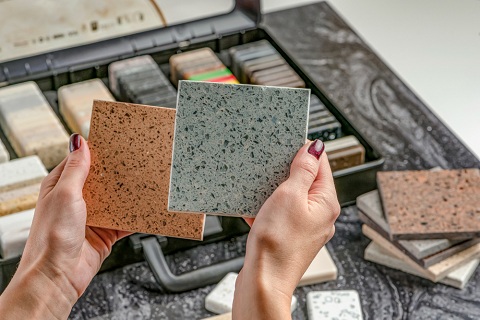The bathroom is often considered a sanctuary within the home—a place to unwind, rejuvenate, and cleanse both body and mind. One of the key elements that contribute to the ambiance and functionality of a bathroom is the choice of tiles. Whether you’re building a new bathroom or renovating an existing one, selecting the right tiles is a crucial decision. This comprehensive guide will help you navigate the intricate world of bathroom tiles, offering insights, tips, and answers to frequently asked questions to ensure that your bathroom becomes a space of beauty and practicality.
The Importance of Bathroom Tiles
Aesthetic Appeal
Tiles are the foundation of your bathroom’s aesthetic. They set the tone, create visual interest, and add a sense of personality to the space. Whether you prefer a contemporary, minimalist look, a classic and timeless design, or something unique and eclectic, your choice of bathroom tiles plays a significant role in achieving your desired style.
Durability
Bathrooms are exposed to moisture, heat, and daily wear and tear, making it essential to choose tiles that can withstand these conditions. Durability is a critical factor when selecting bathroom tiles, ensuring they remain attractive and functional over the years.
Hygiene
Bathrooms require a high level of cleanliness. Tiles are not only easy to clean but also hygienic, as they do not harbor allergens or bacteria. The right tile choice can help maintain a healthy bathroom environment.
Types of Bathroom Tiles
Choosing the right tiles for your bathroom involves understanding the various types available. Here are some common options:
Ceramic Tiles
- Ceramic tiles are cost-effective and come in a wide range of designs, sizes, and colors.
- They are relatively easy to clean, making them a popular choice for bathrooms.
- However, they may be more susceptible to chipping and cracking than some other options.
Porcelain Tiles
- Porcelain tiles are known for their exceptional durability and water resistance.
- They are available in a variety of styles, including those that mimic natural stone or wood.
- While they can be more expensive, their longevity often justifies the cost.
Natural Stone Tiles
- Natural stone tiles, such as marble, granite, and travertine, add an elegant and timeless touch to any bathroom.
- They are durable and can last a lifetime when properly maintained.
- However, natural stone tiles are more expensive and may require regular sealing to prevent staining.
Glass Tiles
- Glass tiles create a stunning visual impact, thanks to their reflective and translucent qualities.
- They are an excellent choice for adding a touch of luxury to your bathroom.
- Keep in mind that glass tiles can be more fragile and may require extra care during installation.
Mosaic Tiles
- Mosaic tiles come in small, individual pieces that allow for intricate and customizable designs.
- They are often used for creating decorative accents, borders, or feature walls in the bathroom.
- Mosaic tiles require more time and precision during installation.
Vinyl Tiles
- Vinyl tiles are a budget-friendly option with good water resistance.
- They are available in various styles, including those that mimic natural materials.
- While they are not as durable as porcelain or natural stone, they can be easily replaced if damaged.
Factors to Consider
Color and Style
The color and style of your bathroom tiles significantly impact the overall aesthetic. Lighter colors can make a small bathroom feel more spacious, while darker shades create a cozy atmosphere. Your style preference, whether modern, rustic, or classic, should guide your choice.
Size and Layout
The size and layout of your bathroom play a vital role in tile selection. Large tiles can make a small space appear more expansive, while small tiles are ideal for intricate designs. The layout, such as a herringbone pattern or a classic brick layout, can add character to your bathroom.
Slip Resistance
Bathroom tiles should provide a safe and slip-resistant surface, especially in wet areas. Look for tiles with a high coefficient of friction (COF) to reduce the risk of accidents.
Maintenance
Consider your willingness and ability to maintain the tiles. Natural stone tiles may require periodic sealing, while glass tiles may need more delicate cleaning. Ceramic and porcelain tiles are typically low-maintenance options.
Budget
Your budget is a significant factor in choosing bathroom tiles. It’s essential to find a balance between your desired style and what you can afford. Remember that some high-quality options, like porcelain, can be more expensive initially but provide long-term value.
Tile Installation
DIY vs. Professional Installation
The decision to install bathroom tiles yourself or hire a professional depends on your experience, time, and the complexity of the project. Professional installers ensure precise and durable results, while DIY can save you money if you’re skilled and patient.
Surface Preparation
Proper surface preparation is crucial for a successful tile installation. Ensure that the walls or floors are clean, dry, and free from any defects or irregularities before tiling.
Grout and Adhesive Selection
Select the appropriate grout and adhesive for your tiles. The type of tile and the location in the bathroom will influence your choice. Ensure that the grout is also sealed to prevent moisture penetration.
Sealing
Depending on the tile material, it may be necessary to seal the tiles and grout lines. Sealing provides an additional layer of protection against moisture and staining.
Frequently Asked Questions (FAQ) about Choosing the Right Tiles for Your Bathroom
The choice of tile size depends on the size of your bathroom and your aesthetic preferences. Large tiles can make a small bathroom appear more spacious, while smaller tiles can be used for intricate patterns or to create a mosaic effect.
Porcelain tiles are an excellent choice for bathrooms with high humidity. They are highly resistant to water and moisture, making them durable and low-maintenance.
Natural stone tiles, such as marble or granite, can be used in bathrooms. However, they require regular sealing to protect against staining and moisture absorption.
To make your bathroom tiles slip-resistant, choose tiles with a high coefficient of friction (COF). Additionally, consider using smaller tiles with more grout lines to increase traction.
Yes, you can install new tiles over existing ones if the old tiles are in good condition and securely adhered. However, it’s essential to ensure the added height won’t cause issues with fixtures and door clearances.
Conclusion
Choosing the right tiles for your bathroom is a decision that combines aesthetics, functionality, and long-term considerations. The tiles you select will contribute to the overall atmosphere of your bathroom and play a pivotal role in its durability. By understanding the various types of bathroom tiles, considering essential factors, and making informed choices, you can create a bathroom that is not only visually appealing but also a joy to use.
Remember that the tile installation process is equally important. Whether you decide to tackle the project yourself or hire a professional, proper surface preparation, adhesive selection, and sealing are key steps in ensuring a successful outcome.
With this comprehensive guide and the answers to frequently asked questions, you’re well-equipped to make the right decisions when it comes to choosing bathroom tiles. Your bathroom can become a true sanctuary—a place of comfort, beauty, and relaxation.





